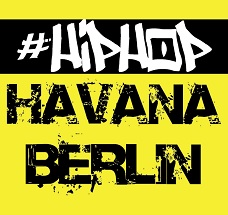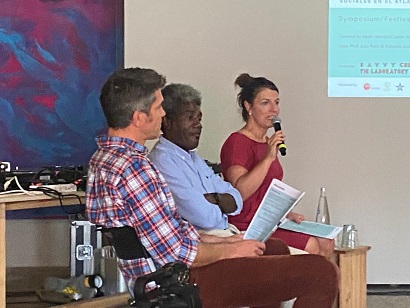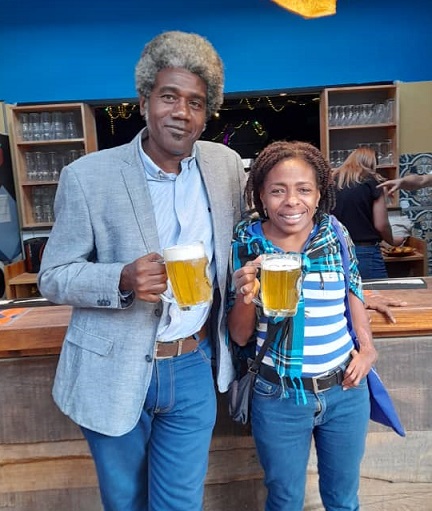|
|
 #hiphophavanaberlin #hiphophavanaberlin
Urban
counter-cultures and social movements in the Black Atlantic
www.facebook.com/hiphophavanaberlin/
"#hiphophavanaberlin is an international project aimed at building bridges
between musicians, activists, artists, and researchers from Havana,
Berlin, and beyond."
#hiphophavanaberlin es un proyecto internacional destinado a construir
puentes entre músicos, activistas, artistas e investigadores de La Habana,
Berlín y más allá.
savvy-contemporary.com/en/events/2022/hiphophavanaberlin
Duration: 2 days
Public · Anyone on or off Facebook
 Two days of concerts and dialogues between Havana and Berlin! Two days of concerts and dialogues between Havana and Berlin!
A symposium/festival curated by Matti Steinitz
Idea/concept: Roberto Zurbano,
Julia
Roth, Matti Steinitz (left)
PROGRAM (Spanish & German Versions below)
FRIDAY (July 29):
10 – 11 a.m.: Welcome address and introduction
Matti Steinitz (Black Americas Network/Center for InterAmerican Studies)
Julia Roth (Center for InterAmerican Studies).
Page
on CALAS.
Michael Thoss (Goethe-Institut),
Alessandra Borchi
(UNESCO Transcultura
Programme)
11 – 12 a.m.: Keynote
Roberto Zurbano (Havana): "Music and
Resistance in the Black Atlantic"
1:00 p.m. – 3:00 p.m. Roundtable “Rap Cubano: From the 1990s to the present”
Rodolfo Rensoli (artist/Havana)
Sandra Álvarez (blogger/Havana-Hannover)
Afibola Sifunola (spoken word artist/Havana)
03:30 – 05:00 p.m. Roundtable: “Hip-Hop as ‘diasporic lingua franca’ in
Berlin”
Michelle Ferreira aka Mica (B.girl/Berlin-Sao Paulo)
Jamal Kamano (MC/Die Urbane. Eine Hip-Hop Partei/ Berlin)
Christoph Schaub (researcher/Berlin)
Verda Kaya (curator/Berlin)
07:00 – 9:00 p.m. #hiphophavanaberlin in concert
Afibola Sifunola (Havana)
MC Müller (Berlin)
Matondo (Berlin)
09:00 p.m. TRANSCULTURA presents: “Hip-Hop from the Caribbean”
Alexx A-Game (Jamaica)
Delma T1 (República Dominicana)
Règleman Afè Popilè (Haiti)
SATURDAY (July 30)
 10:00 – 12:00 a.m. TRANSCULTURA Symposium: “Hip-hop and cultural
cooperation between the Caribbean and the European Union” 10:00 – 12:00 a.m. TRANSCULTURA Symposium: “Hip-hop and cultural
cooperation between the Caribbean and the European Union”
01:00 – 3 p.m. Roundtable: “Afro-diasporic dialogues: Anti-racist and
black feminist movements in Havana & Berlin”
Roberto Zurbano (activist-author/Havanna)
Aracely Rodríguez
(researcher/Havanna)
Sandra Bello (activist/Berlin-Rio de Janeiro)
Nana Asafu-Adjei (activist/ Die Urbane. Eine Hip-Hop Partei /Hamburg)
3:30 – 5.30 p.m. Film screening & discussion:
"Short Radiography of Hip Hop in Cuba" (2004) Se puede ver/can
be viewed at
www.facebook.com/ricardo.bacallao.5/videos/4540104842727808
Talent listed at:
www.berlinale-talents.de/bt/project/profile/16095
Q&A with director Ricardo Bacallao (Havana/Berlin) and
Rodolfo Rensoli
(Havana)
7:00 p.m. #hiphophavanaberlin in concert
MC Josh (Berlin)
Kana & Mavie (Berlin)
La Reyna y la Real (Havana)
Nilo MC (Havana/Berlin)
Carmel Zoum (Berlin)
11:00 p.m. After Show Party
DJ
Bongo &
El Vago [La Regla
Party]
DJs Matatu & Paul Fondue [Black Atlantic Beatz]
#hiphophavanaberlin: Urban counter-cultures and social movements in the
Black Atlantic
(Version español
Deutsche Fassung)
 Hip-Hop, Havana, and Berlin have more in common than many people realize.
During the Cold War era, there was a lively exchange between the socialist
"brother states" GDR and Cuba, in the course of which many young Cubans
came to Berlin. To this day, there is a vibrant Cuban community in Berlin
that has an important place, not least in the city’s Black and Latino
music scenes. Also, Black Havana and Black Berlin are important locations
of the African Diaspora: while Havana was one of the central ports of the
transatlantic slave trade and Afro-Cuban culture and history still shape
the city today, ever since the era of German colonialism Berlin has become
home to an increasing number of African and Afro-Latin American migrants.
In both cities, anti-black racism is a fact – a reality that has been
neglected by official discourse in East Berlin as well as in Havana. Hip-Hop, Havana, and Berlin have more in common than many people realize.
During the Cold War era, there was a lively exchange between the socialist
"brother states" GDR and Cuba, in the course of which many young Cubans
came to Berlin. To this day, there is a vibrant Cuban community in Berlin
that has an important place, not least in the city’s Black and Latino
music scenes. Also, Black Havana and Black Berlin are important locations
of the African Diaspora: while Havana was one of the central ports of the
transatlantic slave trade and Afro-Cuban culture and history still shape
the city today, ever since the era of German colonialism Berlin has become
home to an increasing number of African and Afro-Latin American migrants.
In both cities, anti-black racism is a fact – a reality that has been
neglected by official discourse in East Berlin as well as in Havana.
In these contexts, Hip-Hop is much more than a musical genre. Since the
1990s, it has evolved into an important platform for the articulation of
anti-racist, feminist, and social critique and cross-border communication
between Afro-diasporic communities in both cities. In Germany, Hip-Hop
played a crucial role when migrant youths fought back against a wave of
racist and nationalist violence after the fall of the Berlin Wall. In
Cuba, the rise of Hip-Hop during the “período especial” of the 1990s ended
decades of enforced silence by black dissidents, giving voice to a growing
sentiment of discontent of Afro-Cuban youth who have been most affected by
persistent socioeconomic inequalities and institutional racism. Currently,
Afro-Cuban rappers are at the forefront of a movement for human rights and
freedom of expression, for which some of them are punished with draconian
prison sentences and others forced into exile. Deeply rooted in the Black
Atlantic tradition of cross-cultural exchange, Hip-Hop has been a key
medium in the forging of networks of solidarity between geographically
distant locales of the African Diaspora.
The symposium/festival #hiphophavanaberlin at Savvy Contemporary in Berlin
is dedicated to precisely these social and transnational dimensions of
Hip-Hop as a “diasporic lingua franca” (El-Tayeb). Over the course of two
days, musicians, DJs, activists, artists, and researchers from Havana,
Berlin, Haiti, Jamaica, and the Dominican Republic will engage in a
dialogue about the importance of Hip-Hop for the creation of a global
Afro-diasporic counter-discourse and resistance through lectures, panel
discussions, film screenings, and live performances. Both evenings will
feature concerts with musicians from Havana, Berlin, and the Caribbean
representing the wide spectrum of international Hip-Hop sounds in the 21st
century.
#hiphophavanaberlin
Contra-culturas urbanas y movimientos sociales en el Átlantico Negro
Hay más conexiones entre el hip-hop, La Habana y Berlín de las que se
conocen. Durante la Guerra Fría hubo un intercambio entre los "estados
hermanos" socialistas de la RDA y Cuba, durante el cual muchos jóvenes
cubanos vinieron a Berlín. Hoy en día, existe una comunidad cubana en
Berlín, que desempeña un importante papel en las escenas de musica latina
y negra de la ciudad. Black Havana y Black Berlín son también lugares
importantes de la diáspora africana: mientras que La Habana fue uno de los
puertos centrales de la trata transatlántica de esclavos y la cultura y la
historia afrocubanas siguen dando forma a la ciudad hoy en día, Berlín se
ha convertido en el hogar de un número creciente de migrantes africanos y
afrolatinoamericanos desde la época del colonialismo alemán. En ambas
ciudades, el racismo anti-negro es un hecho, una realidad que fue negada
por el discurso oficial tanto en Berlín Oriental como en La Habana.
En estos contextos, el hip-hop es mucho más que un género musical. Desde
los años 90, se ha convertido en una importante plataforma para la
articulación de la crítica antirracista, feminista y social y para la
comunicación transfronteriza entre las comunidades afrodiaspóricas de
ambas ciudades. En Alemania, el hip-hop desempeñó un papel crucial cuando
jóvenes migrantes resistieron a una ola de violencia racista y
nacionalista tras la caída del Muro de Berlín. En Cuba, el auge del
hip-hop en el "período especial" de los años 90 puso fin a décadas de
silencio forzado por parte de la disidencia negra y dio voz al creciente
descontento de la juventud afrocubana más afectada por las persistentes
desigualdades socioeconómicas y el racismo institucional. En la
actualidad, los raperos afrocubanos están a la cabeza de un movimiento por
los derechos humanos y la libertad de expresión, por el que algunos son
castigados con penas de prisión draconianas y otros se ven obligados a
exiliarse. El hip-hop está profundamente arraigado en la tradición del
Átlantico Negro de intercambio cultural y es un medio clave en la
construcción de redes de solidaridad entre lugares geográficamente
distantes de la diáspora africana.
El simposio/festival #hiphophavanaberlin en el SAVVY Contemporary de
Berlín está dedicado precisamente a estas dimensiones sociales y
transnacionales del hip-hop como "lingua franca diaspórica" (El-Tayeb).
Durante dos días, músicos, DJs, activistas, artistas y académicos de La
Habana, Berlín, Haití, Jamaica y la República Dominicana entablarán un
diálogo sobre la importancia del hip-hop para el contra-discurso
afro-diásporico global y la resistencia anti-racista en conferencias,
paneles de discusión, proyecciones de películas y actuaciones en vivo.
Ambas veladas contarán con conciertos de músicos de La Habana, Berlín y el
Caribe, que representan el amplio espectro de los sonidos internacionales
del hip-hop en el siglo XXI.
#hiphophavanaberlin: Urbane Gegen-Kulturen und soziale
Bewegungen im Black Atlantic
Hip-Hop, Havanna und Berlin haben mehr Gemeinsamkeiten, als vielen
Menschen bewusst ist. In der Zeit des Kalten Krieges gab es einen regen
Austausch zwischen den sozialistischen "Bruderstaaten" DDR und Kuba, in
dessen Verlauf viele junge Kubaner*innen nach Berlin kamen. Bis heute gibt
es in Berlin eine lebendige kubanische Community, die nicht zuletzt in der
Latino- und Black Music-Szene der Stadt einen wichtigen Platz einnimmt.
Black Havana und Black Berlin sind auch wichtige Orte der Afrikanischen
Diaspora: Während Havanna einer der zentralen Häfen des transatlantischen
Sklavenhandels war und afro-kubanische Kultur und Geschichte die Stadt bis
heute prägen, ist Berlin seit der Zeit des deutschen Kolonialismus Heimat
für eine wachsende Zahl afrikanischer und afro-lateinamerikanischer
Migrant*innen geworden. In beiden Städten ist anti-schwarzer Rassismus
eine Tatsache - eine Realität, die sowohl in Ost-Berlin als auch in
Havanna vom offiziellen Diskurs geleugnet wurde.
In diesen Kontexten ist Hip-Hop viel mehr als nur ein Musikgenre. Seit den
1990er Jahren hat er sich zu einer wichtigen Plattform für die
Artikulation von antirassistischer, feministischer und sozialer Kritik und
für die grenzüberschreitende Kommunikation zwischen afro-diasporischen
Communities in beiden Städten entwickelt. In Deutschland spielte Hip-Hop
eine entscheidende Rolle, als sich jugendliche Migrant*innen nach dem Fall
der Berliner Mauer gegen eine Welle rassistischer und nationalistischer
Gewalt wehrten. In Kuba beendete der Aufstieg des Hip-Hop in der "período
especial" der 1990er Jahre das jahrzehntelange erzwungene Schweigen
schwarzer Dissident*innen und verlieh der wachsenden Unzufriedenheit
afrokubanischer Jugendlicher, die am stärksten von den anhaltenden
sozioökonomischen Ungleichheiten und dem institutionellen Rassismus
betroffen sind, eine Stimme. Gegenwärtig stehen afrokubanische Rapper an
der Spitze einer Bewegung für Menschenrechte und Meinungsfreihet, für die
einige von ihnen mit drakonischen Gefängnisstrafen bestraft und andere ins
Exil gezwungen werden. Hip-Hop ist tief in der für den Black Atlantic
charakteristischen Tradition des interkulturellen Austauschs verwurzelt
und ist ein Schlüsselmedium bei der Bildung von Solidaritätsnetzwerken
zwischen geografisch weit entfernten Orten der Afrikanischen Diaspora.
Das Symposium/Festival #hiphophavanaberlin im Berliner SAVVY Contemporary
widmet sich genau diesen sozialen und transnationalen Dimensionen des
Hip-Hop als "diasporische lingua franca" (El-Tayeb). Zwei Tage lang werden
Musiker*innen, DJs, Aktivist*innen, Künstler*innen und
Wissenschaftler*innen aus Havanna, Berlin, Haiti, Jamaika und der
Dominikanischen Republik in Vorträgen, Podiumsdiskussionen,
Filmvorführungen und Live-Performances einen Dialog über die Bedeutung von
Hip-Hop für globalen afro-diasporische Gegendiskurses und
antirassistischen Widerstand führen. An beiden Abenden finden Konzerte mit
Musikern aus Havanna, Berlin und der Karibik statt, die das breite
Spektrum internationaler Hip-Hop-Sounds im 21. Jahrhundert repräsentieren.
|




![]()